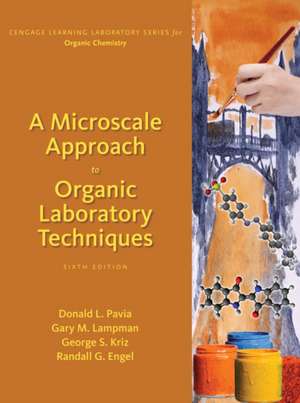A Microscale Approach to Organic Laboratory Techniques
Autor Donald Pavia, George Kriz, Gary Lampman, Randall Engelen Limba Engleză Hardback – 2017
Preț: 592.23 lei
Preț vechi: 759.20 lei
-22% Nou
Puncte Express: 888
Preț estimativ în valută:
113.36€ • 123.17$ • 95.28£
113.36€ • 123.17$ • 95.28£
Carte disponibilă
Livrare economică 31 martie-14 aprilie
Preluare comenzi: 021 569.72.76
Specificații
ISBN-13: 9781305968349
ISBN-10: 1305968344
Pagini: 1056
Dimensiuni: 218 x 277 x 41 mm
Greutate: 2.18 kg
Ediția:6th edition
Editura: CENGAGE LEARNING
ISBN-10: 1305968344
Pagini: 1056
Dimensiuni: 218 x 277 x 41 mm
Greutate: 2.18 kg
Ediția:6th edition
Editura: CENGAGE LEARNING
Notă biografică
Donald L. Pavia earned his BS degree in chemistry from Reed College and his PhD in organic chemistry from Yale University. In 1970, he joined the faculty at Western Washington University as Assistant Professor and now holds the rank of Professor Emeritus. He is the coauthor of two organic laboratory books that include techniques and experiments: INTRODUCTION TO ORGANIC LABORATORY TECHNIQUES: A MICROSCALE APPROACH (Cengage Learning), and A SMALL SCALE APPROACH TO ORGANIC LABORATORY TECHNIQUES (Cengage Learning), as well as MICROSCALE AND MACROSCALE TECHNIQUES IN THE ORGANIC LABORATORY (Cengage Learning), which highlights techniques to be used with a faculty member's own experiments. He is a co-author, with Gary M. Lampman, George S. Kriz and James R. Vyvyan of an organic spectroscopy book, INTRODUCTION TO SPECTROSCOPY (Cengage Learning). Professor Pavia's research interests center on the synthesis and reactions of valence tautomeric and photochromic compounds, especially pyrylium-3-oxide tautomers. Autoxidations are a special interest. His other interests include the use of computers in teaching organic chemistry, both for lecture presentation and for the simulation of laboratories. He is the author of several computer programs. One such program is SQUALOR (Simulated Qualitative Organic Analysis) for which he won the 1986 EDUCOM/NCRIPTAL award. The program is designed for teaching the methods for solving organic unknowns.
